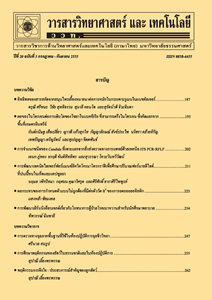กระบวนการหาทางเลือกที่เหมาะสมในการจัดการขยะชุมชนตามแนวพระราชดำริ : กรณีศึกษา ชุมชนสุขใจวิลเลจ เขตบางเขน กรุงเทพมหานคร
Main Article Content
Abstract
บทคัดย่อ
การศึกษาครั้งนี้ มีวัตถุประสงค์เพื่อศึกษาข้อมูลองค์ประกอบขยะในพื้นที่ และศึกษากระบวนการหาทางเลือกที่เหมาะสมในการจัดการขยะชุมชน ของชุมชนสุขใจวิลเลจ เขตบางเขน กรุงเทพมหานคร กระบวนการวิจัยประกอบไปด้วยการศึกษาองค์ประกอบของขยะมูลฝอย การสนทนากลุ่มย่อย การประชุมกลุ่มย่อย และการสำรวจโดยใช้แบบสอบถาม เพื่อหาทางเลือกที่เหมาะสมในการจัดการขยะชุมชน ผลการวิจัยพบว่าองค์ประกอบขยะมูลฝอยของชุมชนสุขใจวิลเลจ มีประเภทขยะที่พบมากสุด คือ ขยะย่อยสลายได้ ร้อยละ 66.65 รองลงมา คือ ขยะรีไซเคิล ร้อยละ 22.86 ขยะอื่น ๆ ร้อยละ 9.64 และขยะอันตราย ร้อยละ 0.85 ตามลำดับ ชุมชนสุขใจวิลเลจเลือกที่จะจัดการขยะประเภทย่อยสลายได้ เพราะเป็นประเภทขยะที่พบมากสุด โดยเลือกใช้เทคโนโลยีฝังกลบขยะในหลุมดินของโครงการศึกษาวิจัยและพัฒนาสิ่งแวดล้อมแหลมผักเบี้ย อันเนื่องมาจากพระราชดำริ มาเป็นต้นแบบในการทำปุ๋ยหมักจากขยะ
คำสำคัญ : ทางเลือก; การจัดการขยะมูลฝอยชุมชน; แนวพระราชดำริ
Abstract
The purposes of this study were to investigate the composition of the waste and find a suitable alternative community based waste management for Sukjai village, Bang Khen district, Bangkok. The research methodology consists of the analysis of solid waste composition, focus group discussion, small groups meeting, and questionnaires to find a suitable alternative waste management for community. The results found that composition of solid waste in Sukjai village majorly was biodegradable waste, 66.65 percent, followed by recyclable waste, 22.86 percent, other waste and hazardous waste, 9.64 percent 0.85 percent, respectively. Sukjai Village chose to handle biodegradable waste due to the most common types of waste found in community. They preferred using of landfill technology from Leam Pak Bia Environmental Development and Research Project, which was developed from the Royal Initiative, as theirs prototype of making compost from garbage.
Keywords: selection; solid waste management; royal initiative


